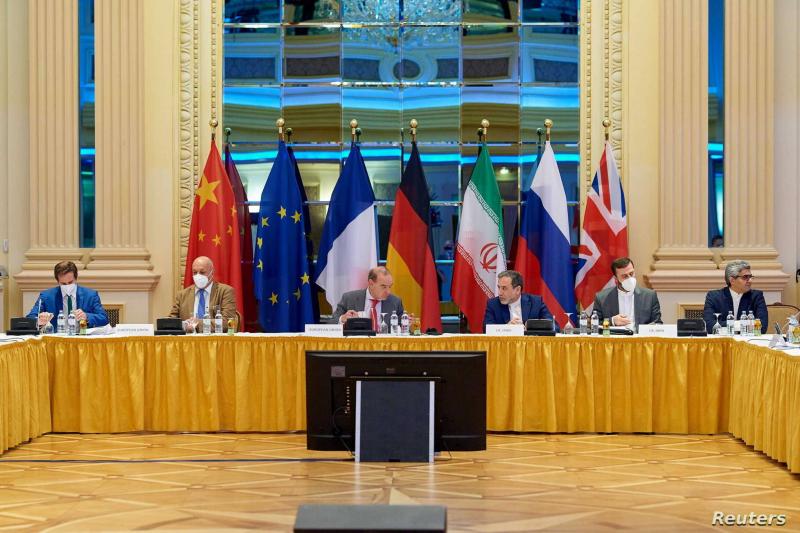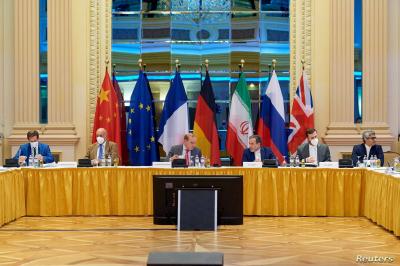Iran believes that delaying nuclear talks with major world powers will strengthen its position at the negotiating table, according to a report by The National Interest. However, the publication questions how long Western nations will wait for Tehran to rejoin the Vienna discussions. Since June, during the final days of former Iranian President Hassan Rouhani's administration, the indirect negotiations that began in April between Iran and the United States in Vienna aimed at reviving the nuclear deal withdrawn by former U.S. President Donald Trump in 2018 have been halted.
On August 3rd, the newly elected Iranian President Ebrahim Raisi stated at his inauguration, "Sanctions on the Iranian nation must be lifted, and we support any diplomatic plan to achieve that." While U.S. diplomats were prepared to resume talks when Raisi took office, Iranian officials halted negotiations while the new administration formed its government and defined its policies. Iran needs negotiations with the West to alleviate the crippling sanctions that have stunted its economy, a goal Raisi has prioritized. However, there is no rush for Iran to resume the Vienna talks, and analysts see little evidence of Iran's desire to negotiate swiftly with major powers.
Some observers believe Iran is benefiting from stalling and continues to build leverage at the negotiating table by increasing uranium enrichment and restricting access for the International Atomic Energy Agency (IAEA). The agreement prevents Iran from enriching uranium above 3.67 percent, significantly lower than the 90 percent threshold needed to develop a nuclear weapon. In this context, experts note that Iran's nuclear program is at its most advanced stage ever regarding the capability to produce nuclear weapons, and the Iranian regime plans to return to the deal with further delays and additional bargaining chips.
Conversely, Iranian Foreign Minister Hossein Amir Abdollahian indicated that returning to negotiations will take two to three months as the new government assumes its tasks and plans any decisions. Unlike the previous administration, Raisi's foreign policy advisors are staunch opponents of rapprochement with the West, aligning with Iran's anti-U.S. ideology that emerged after the 1979 Islamic Revolution. Raisi's administration seems to be trying to demonstrate that negotiating with the West is not a priority in Iran’s foreign policy agenda.
However, Iran's unwillingness to resume talks has drawn reactions from world leaders who are weary of waiting for negotiations to recommence. French President Emmanuel Macron told Raisi in a phone call on September 5th, "Iran must quickly resume the Vienna talks to reach a conclusion and end, without delay, all nuclear activities that violate the 2015 agreement." Israeli Prime Minister Naftali Bennett remarked during an Israeli Cabinet meeting on September 12th that Iran is "overstepping, and we need to set a clear deadline." U.S. Secretary of State Antony Blinken emphasized that "time is running out for Iran to return to the agreement," adding, "I will not set a deadline for that, but we are approaching a point where a strict return to compliance with the Joint Comprehensive Plan of Action will not replicate the benefits that the agreement provided."
For its part, Iran claims that "the country is ready to resume talks, but negotiations under pressure will not bear fruit." Iranian conservative politician Kazem Jalali mentioned in an interview with the Russian newspaper Izvestia that Tehran is determined to continue the Vienna negotiations regarding the nuclear deal, but highlighted that Iran's priority remains the lifting of all U.S. sanctions, not "negotiations for the sake of negotiations."
According to the report, there are unconfirmed reports about the potential exclusion of Iran's Foreign Ministry from the talks, as was the case before Rouhani's era, with the Iranian Supreme National Security Council resuming negotiations. Despite the Iranian Foreign Ministry spokesperson Saeed Khatibzadeh announcing that Iran will soon resume the Vienna talks, the lack of a specified timeframe for the resumption of negotiations amounts to yet another delaying tactic. For Iran, extending talks and postponing them does not raise concerns that Tehran may miss out on key concessions from the West. According to Raisi's administration, perhaps a late start with a specific outcome is better than a rapid initiation without achieving the desired result.




